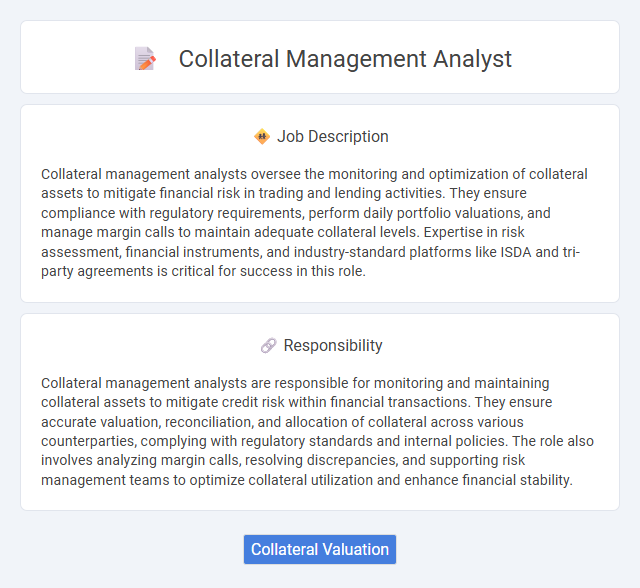
Collateral management analysts oversee the monitoring and optimization of collateral assets to mitigate financial risk in trading and lending activities. They ensure compliance with regulatory requirements, perform daily portfolio valuations, and manage margin calls to maintain adequate collateral levels. Expertise in risk assessment, financial instruments, and industry-standard platforms like ISDA and tri-party agreements is critical for success in this role.
Individuals with strong analytical skills and attention to detail are likely suitable for a Collateral Management Analyst role, as this job demands precise risk assessment and data evaluation. Those who can thrive in high-pressure environments and demonstrate effective communication are probably more effective in managing collateral and resolving discrepancies. Conversely, individuals uncomfortable with complex financial regulations or routine data analysis might find this role challenging.
Qualification
Collateral management analysts require strong analytical skills, proficiency in financial modeling, and expertise in risk assessment to effectively manage collateral portfolios. A background in finance, economics, or related fields combined with certification such as FRM or CFA enhances qualifications. Experience with regulatory compliance, market risk, and collateral optimization tools is essential for success in this role.
Responsibility
Collateral management analysts are responsible for monitoring and maintaining collateral assets to mitigate credit risk within financial transactions. They ensure accurate valuation, reconciliation, and allocation of collateral across various counterparties, complying with regulatory standards and internal policies. The role also involves analyzing margin calls, resolving discrepancies, and supporting risk management teams to optimize collateral utilization and enhance financial stability.
Benefit
A Collateral Management Analyst likely plays a critical role in reducing financial risks by ensuring accurate valuation and monitoring of collateral assets. They probably enhance operational efficiency through automated processes and compliance with regulatory standards. This role may offer career growth opportunities within finance due to its essential function in risk management and capital optimization.
Challenge
The role of a Collateral Management Analyst likely involves navigating complex regulatory requirements and managing high volumes of financial data, which can present significant challenges. There is a strong probability that maintaining accuracy while processing collateral valuations and margin calls under tight deadlines requires advanced analytical skills and attention to detail. Stressors may also include coordinating among multiple stakeholders to minimize counterparty risk and ensure compliance.
Career Advancement
A Collateral Management Analyst plays a critical role in risk mitigation by ensuring accurate tracking and valuation of collateral assets within financial institutions. Mastery in regulatory compliance, financial instruments, and data analysis positions professionals for advancement into senior analyst, risk management, or collateral strategy roles. Proficiency in advanced software tools and certifications such as FRM or CFA can accelerate career growth and leadership opportunities in banking and investment firms.
Key Terms
Collateral Valuation
Collateral management analysts specialize in assessing and monitoring the value of assets pledged as security for loans or derivatives. Precise collateral valuation involves analyzing market data, credit risk, and asset liquidity to ensure compliance with regulatory requirements and minimize counterparty risk. Advanced valuation techniques support accurate margin calculations and optimize collateral allocation strategies in dynamic financial markets.
 kuljobs.com
kuljobs.com